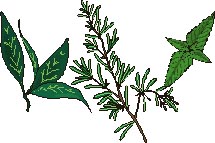Complete Herbal Home

|
 |
| What is a herb? | |
| It often seems that the term of herb has been limited to only a dozen or so of seasoning and a handful of healing plants. |
 |
| Carlos Castenada defined Herbs as the plants of wisdom. Allies who could help, assist and lead you along your path of life, whether it be by healing or by an experience of becoming unwell and learning from it. |
|
| To the botanist a herb is a shortening of the word herbaceous and describes a non-woody plant, which dies back down to the ground annually. Botanically the term is chiefly applied to perennials, although it can be applied to annuals as well as biennials. The primary definition given by dictionaries is "a seed-producing annual, biennial, or perennial that does not develop persistent woody tissue but dies down at the end of a growing season." However these botanical definitions eliminate many plants that are traditionally regarded and used as herbs. There are in fact many definitions, but the one that I like best is very short and to the point, 'a useful plant'. If any part of a plant; flower, leaf, or stem is useful, or has efficacious properties, as an ingredient for health, flavour, or fragrance then to me it is a herb. To me herbs can include trees, annuals, perennials, seaweed and even funghi! Herbs can be used medicinally, culinarily, as pest repellants, dyes or as aromatics. They can be used to make teas, perk up food or to add flavour to vinegars, butters, dips, confectionary and mustards. Many herbs are grown for their fragrance and are used in potpourris or to scent bathwater, candles, oils or perfumes. The scientific / biochemical study of plants as medicine has its own terminology
Phytomedicine, Phytotherapy and Phytopharmacology, to name but a few. |
|
 |